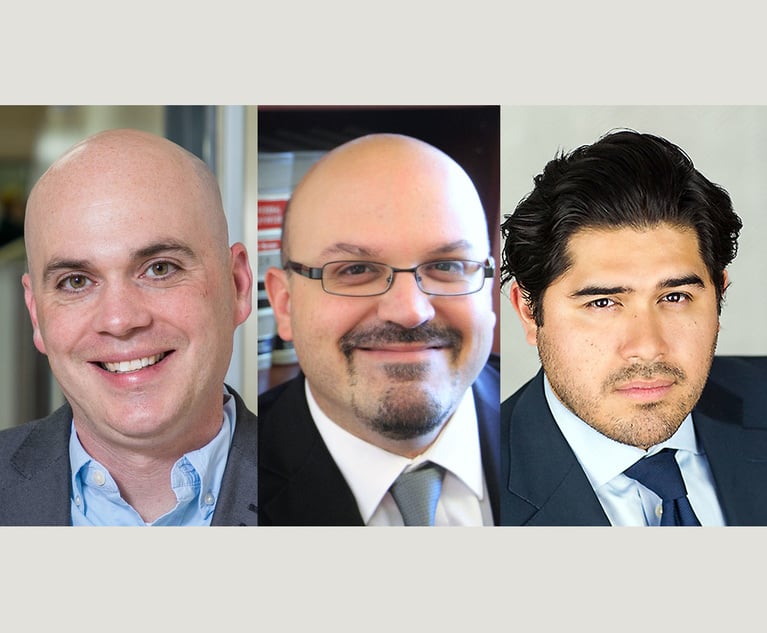 Michelle Schaap of Chiesa Shahinian & Giantomasi and Kelly S. Crawford of Riker Danzig Scherer Hyland & Perretti.
Michelle Schaap of Chiesa Shahinian & Giantomasi and Kelly S. Crawford of Riker Danzig Scherer Hyland & Perretti.'An Ongoing Dialogue About How You Get It Done': Work-Life Choices Still in Forefront
"This is a conversation we have at the bar [association] level," said Kelly S. Crawford of Riker Danzig Scherer Hyland & Perretti. "It's an ongoing dialogue about how you get it done."
April 10, 2019 at 10:00 AM
7 minute read
At law firms, parental leave policies are changing, and it seems there's a heightened level of awareness about parenthood's impact on professional development. But even in what appears to be a more enlightened age in the legal profession, women lawyers are still pushing hard—if not to do it all, then at least to try to figure it all out.
“This is a conversation we have at the bar [association] level,” said Kelly S. Crawford of Riker Danzig Scherer Hyland & Perretti in Morristown. “It's an ongoing dialogue about how you get it done.”
She added, “there's never a perfect solution.”
“To make it in a highly competitive field, especially litigation … you have to dedicate everything to that,” said Crawford, who is co-chairwoman of the firm and leads its products liability and mass tort practice. “You can't do it half-assed. … Your schedule is not your own. It's dictated by the courts and the cases.”
Michelle Schaap, New Jersey Women Lawyers Association president and a partner at Chiesa Shahinian & Giantomasi in West Orange, said the topic of making a career and a family, and the attending balances and sacrifices, is discussed at every level, formally and informally.
“It is continuing to be a challenge for women,” Schaap said. “As a result, I think it is still going to be a part of our programming.”
Schaap said it's important to remember that there's no “right way” to approach the issue. “When you say 'out of balance,' that assumes that there's a right way.”
For some lawyers, it seems, options beyond the traditional are certainly on the table. Last month, for example, law.com reported on women lawyers, busy with the practice and career-building, who froze eggs and embryos for future family planning.
But even the more common cases of “juggling” and “sacrifice” are each unique in their own ways.
“My own experience was not typical,” said Schaap, who had her first child while living in Tokyo, where she and her husband had moved in the late 1980s because of a work opportunity for him. Schaap had a job with a Japanese firm waiting there. She practiced with a predecessor firm of Mori Hamada & Matsumoto, and after leaving work for a time to have her first son, went back to work at the firm part time.
“I literally was the two-headed monster no one had ever seen before,” trying to juggle work and family, but the firm accommodated her very well, she said.
“They put a fax machine in my house, which they did not abuse,” and paid her 80 percent of her salary, plus bonuses. “It was truly extraordinary,” she said.
Schaap had her second child after the family had moved back to the U.S., while she was in-house counsel with Toys R Us. She was out of work for two months. First she returned to work two days a week for four months, and then returned full time. Schaap said she wanted to work with management on the arrangement because a prior maternity leave arrangement with a different lawyer had ended badly.
“I was committed to make it work … because I wanted other people to be able to do what I did,” Schaap said.
She noted colleagues' decisions over the years: A woman lawyer who wanted to be a premier rainmaker and decided not to have children; another who had children but ceded most of the family responsibilities to her husband; a third who changed to a trusts and estate practice because she saw it as more flexible and thus family-friendly.
“The firms that are smart realize that if you give an accommodation, you're going to get back from a dedicated employee in spades,” Schaap said.
But, she said, women are still confronted with questions about their dedication to law practice when they start families.
“I think women still are getting that attitude,” Schaap said. “It's still out there.”
“Just because we become pregnant does not mean that our brains shut off. … I think we are masters at juggling,” she added. ”You don't hear 'mommy track' anymore, but I do think that thought process is still out there for some firms.”
Crawford has been Riker Danzig co-chairwoman since January 2018. She started with the firm in 1992. Being in firmwide management “opens your eyes to the fact that you've got practical realities,” she said.
At the firm-management level, as well as at bar groups, the challenge of balance and sacrifice is discussed “all the time,” Crawford said. Numerous bar panels over the years, she noted, have been dedicated to addressing the question, “Can you do it all as a woman?”
“People will tell you all kinds of [work-life] balance things,” but goals and realities are frequently at odds, she said, noting attorneys who left the practice to have children and then returned to different practice areas, or became contract lawyers.
“You can't do it all. People say you can, but you can't,” she said. “I personally might have had a much bigger family,” added Crawford, who has one college-age daughter.
“I think the law industry in general is way behind the rest of the professional world when it comes to accommodations,” Crawford said. “We have a long way to go.”
 Suzanne M. Bradley
Suzanne M. Bradley
Discussions about how to get it done have prompted action. In mid-2017, Suzanne Bradley of Pashman Stein Walder Hayden in Hackensack helped launch the firm's Women's Leadership Committee. The committee, she said, was the product of such discussions and now helps drive firm policy.
“A few of us thought it would be more productive to have a recurring, dedicated time and space to tackle these issues,” said Bradley, who earlier this year was promoted from associate to counsel.
The first issue addressed by the committee was parental leave, and the committee's efforts helped bring about a change to the parental leave policy at Pashman Stein, which in 2017 instituted up to 20 weeks of leave with full pay.
The committee now is taking on the review process, and looking to make year-end reviews “more of a two-way conversation” between associates and partners, according to Bradley.
At the group's January meeting, the committee began discussing the reasons why senior women might leave the legal profession, and the issue of work-life choices arises regularly, she said.
“It's certainly something that we discuss frequently,” Bradley said. ”The tough part is, what do we do about it? That's the nice part—the group wants to come up with solutions.”
In terms of sharing experiences, ”our group's been extremely open,” including with guidance from women lawyers of older generations, Bradley said.
“'It will get better,'” those lawyers say, according to Bradley. ”Hearing those voices is extremely important.”
The story for some women lawyers, according to Bradley, is: “They get it all done, it just doesn't look the same as it used to.”
This content has been archived. It is available through our partners, LexisNexis® and Bloomberg Law.
To view this content, please continue to their sites.
Not a Lexis Subscriber?
Subscribe Now
Not a Bloomberg Law Subscriber?
Subscribe Now
NOT FOR REPRINT
© 2024 ALM Global, LLC, All Rights Reserved. Request academic re-use from www.copyright.com. All other uses, submit a request to [email protected]. For more information visit Asset & Logo Licensing.
You Might Like
View All
'I've Worked Until 2 in the Morning': Lawyers Brace for Trump Policy
6 minute read
GOP Trifecta in Washington Could Put Litigation Finance Industry Under Pressure

Lowenstein Hires Ex-FTX US General Counsel Ryne Miller to Lead Its Commodities, Derivatives Practice
3 minute read
Many Lawyers Are Reeling From Election Results, but Leaders Are Staying Mum
6 minute readTrending Stories
- 1Elon Musk Names Microsoft, Calif. AG to Amended OpenAI Suit
- 2Trump’s Plan to Purge Democracy
- 3Baltimore City Govt., After Winning Opioid Jury Trial, Preparing to Demand an Additional $11B for Abatement Costs
- 4X Joins Legal Attack on California's New Deepfakes Law
- 5Monsanto Wins Latest Philadelphia Roundup Trial
Who Got The Work
Michael G. Bongiorno, Andrew Scott Dulberg and Elizabeth E. Driscoll from Wilmer Cutler Pickering Hale and Dorr have stepped in to represent Symbotic Inc., an A.I.-enabled technology platform that focuses on increasing supply chain efficiency, and other defendants in a pending shareholder derivative lawsuit. The case, filed Oct. 2 in Massachusetts District Court by the Brown Law Firm on behalf of Stephen Austen, accuses certain officers and directors of misleading investors in regard to Symbotic's potential for margin growth by failing to disclose that the company was not equipped to timely deploy its systems or manage expenses through project delays. The case, assigned to U.S. District Judge Nathaniel M. Gorton, is 1:24-cv-12522, Austen v. Cohen et al.
Who Got The Work
Edmund Polubinski and Marie Killmond of Davis Polk & Wardwell have entered appearances for data platform software development company MongoDB and other defendants in a pending shareholder derivative lawsuit. The action, filed Oct. 7 in New York Southern District Court by the Brown Law Firm, accuses the company's directors and/or officers of falsely expressing confidence in the company’s restructuring of its sales incentive plan and downplaying the severity of decreases in its upfront commitments. The case is 1:24-cv-07594, Roy v. Ittycheria et al.
Who Got The Work
Amy O. Bruchs and Kurt F. Ellison of Michael Best & Friedrich have entered appearances for Epic Systems Corp. in a pending employment discrimination lawsuit. The suit was filed Sept. 7 in Wisconsin Western District Court by Levine Eisberner LLC and Siri & Glimstad on behalf of a project manager who claims that he was wrongfully terminated after applying for a religious exemption to the defendant's COVID-19 vaccine mandate. The case, assigned to U.S. Magistrate Judge Anita Marie Boor, is 3:24-cv-00630, Secker, Nathan v. Epic Systems Corporation.
Who Got The Work
David X. Sullivan, Thomas J. Finn and Gregory A. Hall from McCarter & English have entered appearances for Sunrun Installation Services in a pending civil rights lawsuit. The complaint was filed Sept. 4 in Connecticut District Court by attorney Robert M. Berke on behalf of former employee George Edward Steins, who was arrested and charged with employing an unregistered home improvement salesperson. The complaint alleges that had Sunrun informed the Connecticut Department of Consumer Protection that the plaintiff's employment had ended in 2017 and that he no longer held Sunrun's home improvement contractor license, he would not have been hit with charges, which were dismissed in May 2024. The case, assigned to U.S. District Judge Jeffrey A. Meyer, is 3:24-cv-01423, Steins v. Sunrun, Inc. et al.
Who Got The Work
Greenberg Traurig shareholder Joshua L. Raskin has entered an appearance for boohoo.com UK Ltd. in a pending patent infringement lawsuit. The suit, filed Sept. 3 in Texas Eastern District Court by Rozier Hardt McDonough on behalf of Alto Dynamics, asserts five patents related to an online shopping platform. The case, assigned to U.S. District Judge Rodney Gilstrap, is 2:24-cv-00719, Alto Dynamics, LLC v. boohoo.com UK Limited.
Featured Firms
Law Offices of Gary Martin Hays & Associates, P.C.
(470) 294-1674
Law Offices of Mark E. Salomone
(857) 444-6468
Smith & Hassler
(713) 739-1250






